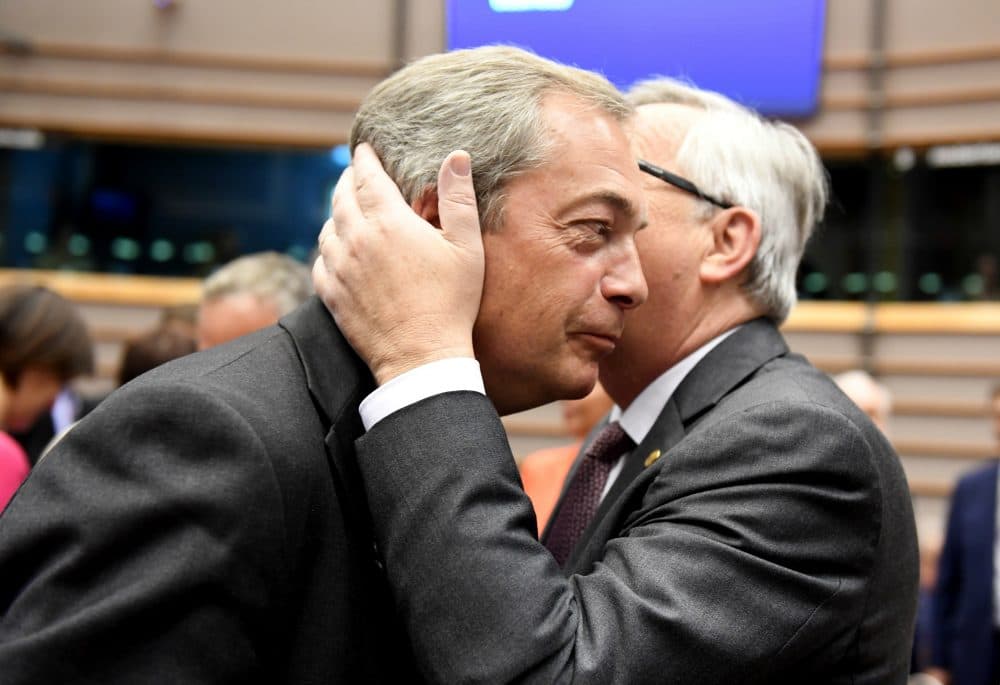Advertisement
Secrets And Lies: Here And Abroad, The High Stakes Gambit To Keep Voters In The Dark

Last Friday, as the world woke up to news that a 52 percent majority of Brits had voted in favor of leaving the European Union, some of those voters reportedly took to Google in massive numbers to find out what “Brexit” and the European Union are. It seems that they were trying — too late — to figure out some basic truths about their momentous decision. By the end of the weekend, the world had begun to learn of the many serious lies Nigel Farage, leader of the UK Independence Party and a chief proponent of the Brexit, and Boris Johnson, London's former mayor and a Member of Parliament, told in order to push that very vote.
Together, these stories shine a spotlight on what is arguably the most pressing problem facing democracies today: Voters don’t know enough about the issues that will shape their lives in order to make informed decisions about them. To function effectively, citizens must have access to clear, truthful information. They have to know who’s telling them what and why. Such information is increasingly hard to come by. And that’s no accident.
The total pile up of lies leaves us spinning.
We live in an age of misinformation. A fog of distortion and lies floats around us. It obscures facts. It makes it near impossible to make out what’s real and what’s fantasy. And too many politicians are shameless about contributing to it.
What do I mean? Consider the story, published 10 days before the Brexit vote results, that our Republican-controlled House of Representatives voted “to protect the identities of wealthy individuals and others who make anonymous, or ‘dark money,’ donations to politically active nonprofit groups.”
Make no mistake, dark money exists primarily to mislead and disenfranchise us.
Read Jane Mayer’s brave, excellent writing about the Koch brothers (who supported the House measure), and you will be clear that the dark money pumped into so many campaigns and ads is spent to paralyze government and mute public opinion. As Mayer documents, in 2003, a large majority of Americans favored taking measures to slow climate change. Once the Koch propaganda machine set to work, however, that changed. “In the scientific community," a climate scientist told Mayer, "the degree of confidence in climate change is rising. In the public, it’s either steady or falling. There’s a divergence. That wedge is what the industry has bought.”
It’s not just the billionaire anti-truth squad that’s obscured facts in service to their own agendas. We’ve been demoralized by years of lies for which no politician or corporation ever had to answer. The familiar litany bears repeating: George W. Bush, Richard Cheney and co., should have been held accountable for so cynically lying to the world about weapons of mass destruction in Iraq. The bankers at Goldman Sachs Group who bet against the risky housing default-swaps they were selling in 2006 and 2007 should have been held accountable for their devious products and grossly illegal practices, but they barely got touched. And then there are the corporate lies – like Purdue Pharma, makers of OxyContin, the supposedly non-addictive painkiller.
Advertisement
The truth is, we are now subjected to our own brand of homegrown, privatized propaganda.
It’s getting worse. In 2015, PolitiFact gave Donald Trump the “Lie of the Year” award, claiming that 76 percent of his pronouncements “false, mostly false, or ‘pants on fire.’” In spite of this, he is his party's nominee — a testament to how inured the voting public has become to a steady stream of untruths.
The total pile up of lies leaves us spinning. We no longer know whom to believe. Imagine a blindfolded child at a birthday party, spun until he’s half-sick with dizziness, who staggers to whack a piñata. That he careens around the room bruising friends and wrecking furniture rather than making contact with the candy-filled papier mâché, that he endangers all, is an apt metaphor for what are being mislabeled “populist uprisings” here and abroad.
Increasing numbers of Americans rightly feel underpaid, abandoned and neglected by their political systems. Thanks to the profound — and intentional — manipulation of information, they’re swinging wildly, swatting at random, and everyone suffers. If the Brexit vote is any indication, the same is true in Britain.
Citizens of all countries deserve better knowledge, fuller disclosure, more access to facts and franker conversation. Perhaps one unintended consequence of this current pandemonium is that we will emerge collectively with a hardier appetite for deep reform. We’ll insist on something cleaner and more honest. Maybe one bit of hope we can find in the Brexit vote is a reminder that we can also harness this moment of turmoil for the good.
